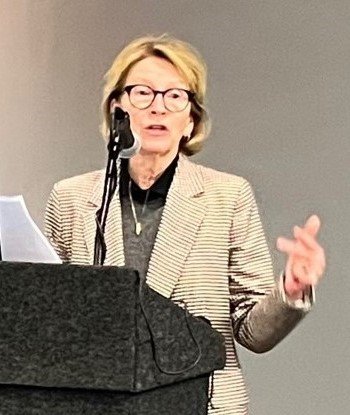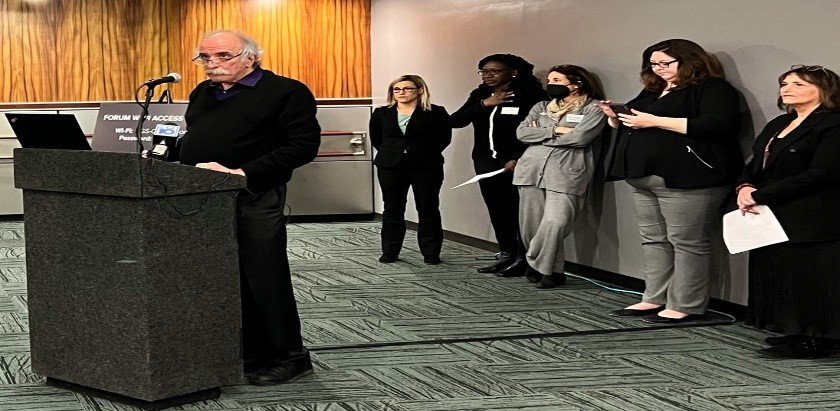NYAPRS Note: Upwards of 100 NYAPRS spirited self and system advocates came to Albany last Thursday to advocate for our 2022 state budget and legislative priorities that included more funding for the community workforce, services and supports and housing; passage of Clean Slate and Treatment Not Jails legislation, advocacy for adult home residents and maternity mental health legislation. A key focus of our activities and news conference was to promote the use of innovative strategies to engage and support people who might otherwise be subject to an involuntary outpatient commitment order as authorized under Kendra’s Law. Our issues received substantial TV and print coverage, see examples below.
Great thanks are due to our featured speakers, OMH Commissioner Ann Sullivan and our legislative mental health committee chairs Assemblymember Aileen Gunther and Senator Samra Brouk as well as our news conference presenters (pictured below) and our members. Special thanks to Fountain House and the MHA of Nassau County for their coordination of the NYC and the LI bus as well as Restoration Society and Recovery Options for the caravans from Western New York.
As we speak, both houses of the legislature are crafting their individual ‘one house’ budget bills: we’ll be looking closely for any additions to the 5.4% COLA that was provided by Governor Hochul and a 5 year extender with no expansions on Kendra’s Law.
Advocates Descend on Albany to Oppose Kendra’s Law Expansion
By Conall Smith NEWS10 Albany, New York March 10, 2022
ALBANY, N.Y. (NEWS10) — After New York State Senator Diane Savino proposed an expansion on Kendra’s Law, a group of mental health and criminal justice advocates descended upon Albany to listen to experts about why they are opposing any expansion.
Under Kendra’s Law, courts in New York State can determine treatment for people with a severe mental illness, sometimes involuntarily. “Kendra’s court order should be seen as a system failure. Every time an order goes out we should say how did we fail to engage this person,” says Harvey Rosenthal, CEO of the New York Association of Psychiatric Rehabilitation Services.
Rosenthal believes Kendra’s Law is the wrong approach to addressing severe mental illness in New York State saying, “too often the court orders are forcing people into the same services that failed them the first time. That doesn’t make any sense. Let’s get these new models up and make them available to people.”
One of the new models Rosenthal talks about is having peers respond to mental health crises, rather than police. Christina Sparrock says when she was having a mental health crisis, police responded for a welfare check to her apartment. When police arrived and began pounding on her door, she felt threatened rather than helped which she says can often stigmatize people not to seek treatment.
“When a peer comes, it’s more like a friendship, buddy buddy,” Sparrock says “they listen to me. They validate my experiences. They make me feel like I’m heard and valued. And I like that relationship because it makes me feel like I’m a human being.”
Brian Stettin, who conceived the law says:
“Kendra’s Law has proven remarkably successful in reducing hospitalization and arrest for the most vulnerable New Yorkers with severe mental illness. Not only does the research show AOT improves treatment outcomes and saves tax dollars, but also that individuals who go through the program do not experience it as coercive or stigmatizing.
If there has been any “failure” concerning Kendra’s Law, it has been a failure to untap its full potential. Too many who meet the legal criteria still do not receive AOT upon their discharge from a hospital stay or jail. Kendra’s Law should be made permanent, and counties statewide should redouble their efforts to apply it to all whose non-adherence to mental health treatment traps them in the “revolving doors” of the mental health and criminal justice systems.”
In January of 1999, Kendra Webdale was waiting for a train in Manhattan when 29-year old Andrew Goldstein pushed Webdale into the path of the oncoming train. Webdale died immediately. Goldstein had a history with mental illness.
In Governor Kathy Hochul’s executive budget, Kendra’s Law could potentially be extended and expanded for another five years until 2027. The law has a sunset clause in it which requires law makers to extend or eliminate the law every five years.
https://www.news10.com/news/advocates-descend-on-albany-to-oppose-kendras-law-expansion/
—–
Mental Health Advocates Fear Criminalization Of Vulnerable People
By Nick Reisman City of Albany Spectrum News March 11, 2022
One night in 2020, a stranger knocked on Christina Sparrock’s door. Frightened, she grabbed a knife. The stranger turned out to be a police officer conducting a wellness check.
For Sparrock, the incident put her in danger. And it demonstrated the stark divergence of response for people suffering from a medical condition like diabetes or cancer.
“They get a visiting nurse, but we as a person living with a mental health concern get the police,” Sparrock said.
New York officials are trying to address public safety and reduce violent incidents that sometimes involve people in a mental health crisis. But advocates for people with mental illness worry vulnerable people will be swept up.
“We’re just people. People in distress,” Sparrock said. “People with a medical condition like mental health.”
Sparrock was in Albany this week to participate in a forum for mental health care advocates meant to chart a way toward policies meant to benefit vulnerable people and away from measures they worry may be too coercive.
Like many people who have mental health needs, Sparrock said more is needed from New York officials to help those who are in crisis. The incident with the police could have been handled by a mentor who, instead of being arrmed and banging on her door, could have taken her for ice cream, she said.
“We need more 24-7 clinics with mental health clinics on every corner like we have Starbucks and McDonald’s so when people can go get help before going to a hospital and sit in an ER and get re-traumatized in an ER,” Sparroack said.
Longtime mental health advocate Harvey Rosenthal is concerned the recent focus on high-profile crimes are leading officials to take more coercive action against people with mental illnesses.
“I think politicians are afraid, and people are afraid,” Rosenthal said.
He’s worried the media coverage of murders involving people with mental illness has painted a broad brush, and unnecessarily stoked fear.
“When you look at a policy through that lens, it’s extremely disruptive,” he said.
Rosenthal is concerned about a proposed expansion of a law that requires people to receive mental health treatment through a court order known as Kendra’s Law.
“It’s not about forcing people into the same services that have already failed,” he said. “It’s about creating these new models and making that the response — not through the lens of they’re violent and we have to lock them up.”
Still, public safety has been rising concern for voters. Polling has shown people feel less safe in their communities and incidents like the murder of Michelle Go last month have spurred calls for action.
Gov. Kathy Hochul and New York City Mayor Eric Adams last month announced plans to implement efforts to deploy crisis intervention teams to the subway system in an effort to improve safety.
“Governor Hochul has made the development of a comprehensive behavioral health crisis system in New York State one of her administration’s key priorities, and in addition to landmark investments to improve psychiatric support for those in crisis, proposed modernizations of Kendra’s Law, including allowing physician testimony by video conference, will help ensure effective implementation,” said Hochul spokeswoman Hazel Crampton-Hayes. “We will work with the legislature this session on how best to keep New Yorkers safe.”
Hochul wants to spend $21 million a year for the “Safe Options Support” outreach teams, which have already led to additional resources and staff to the subway system in New York City. She is also backing $35 million for the coming budget as well as $60 million the following for the creation of the 988 behavioral crisis hotline.
And Hochul is backing 10,000 units of supportive housing for people who are living with mental illness and are in need of a stable place to live. The state is also planning to spend more than $100 million over the next five years for a dozen Intensive Crisis Stabilization Centers for people who are in a mental health crisis.
Advocates are hopeful solutions like supportive housing and peer mentorship program will be explored and put in place. And while the pandemic has highlighted concerns surrounding mental health, Sparrock said a broader understanding is needed.
“I think people understand it and it’s unfortunate that COVID is actually de-stigmatizing mental health,” she said, “but it’s not helping us de-criminalize mental health.”
———-
Advocates For Mentally Ill Concerned About Changes To Forced Treatment
By Zack Fink NY1 March 11, 2022
Earlier this year, Michelle Go was shoved onto the subway tracks and killed by an oncoming train. It was yet another seemingly random attack underground – the kind of attack that has New Yorkers on alert.
What You Need To Know
-
Both Mayor Adams and Gov. Hochul are calling for a strengthening of laws governing mental illness and treatment
-
The effort comes after the violent subway death of Michelle Go, who was pushed onto the tracks in January
-
Advocates say the rush to make changes may infringe on people’s rights
In response to the rising violence and rising fears, both Mayor Eric Adams and the Gov. Kathy Hochul are pushing for changes that would allow mentally unhealthy people to be forced into treatment.
“Kendra’s law. Let’s start using it,” said Mayor Adams last month. “Let’s start looking at, how do we modify it to do a better job to those who are a danger to themselves and others.”
Kendra’s law was passed by the state legislature after a woman named Kendra Webdale was pushed onto the subway tracks and killed in 1999.
The law allows the state to impose outpatient psychiatric treatment for those determined to be mentally unfit. But advocates for the mentally ill are concerned there may be a rush to judgment.
“We are looking at it through the wrong lens,” said Harvey Rosenthal of the New York Association of Psychiatric Rehabilitation Services. “The issue is not to punish people and to blame them for the failure of the system. It’s to fix the system. And we like to say it’s to fix the services, not force them.”
The laws governing involuntary commitment in New York State are very rigid. The rights of the individual are protected, unless a person has demonstrated a threat to themselves or others.
Gov. Hochul has proposed strengthening Kendra’s law to give the state more leeway in forcing people into treatment.
“We need to talk about what’s involved in removal and involuntary commitment for the highest need individuals, individuals who have truly demonstrated that they are not taking care of themselves” Hochul said in February.
But critics say there is a misconception about mental illness and violence.
“Four percent of violence is caused by people with mental illness,” Rosenthal said. “People with mental illness are 11 times as likely to be victims of violence, five times more likely to be murdered. But when you get this human cry it becomes, ‘The mentally ill are dangerous and violent. It’s frightening. And we have to force them into treatment,’ which, frankly, doesn’t work because people don’t stay with it.”
Right now, there is no legislation being proposed that strengthens Kendra’s law specifically. The governor is going to include it as part of the budget, but it’s unclear if lawmakers support her efforts.
——–
Advocates Against Expansion Of “Kendra’s Law”
by Julia Popowych Rochester First March 12, 2022
ALBANY, N.Y. (WROC) — A group of mental health advocates rallied in Albany to voice their opposition to any expansion to “Kendra’s Law”.
The law, which was enacted in 1999, allows courts in New York state to determine treatment for people with a severe mental illness, sometimes involuntarily.
Harvey Rosenthal is the CEO of the New York Association Of Psychiatric Rehabilitation Services, and he believes Kendra’s Law is the wrong approach to addressing severe mental illness In New York State.
“Too often the court orders are forcing people into the same services that failed them the first time. That doesn’t make any sense. Let’s get these new models up and make them available to people.” Rosenthal said.
Those who are for the law argue it ensures that people who require mental health treatment get the specific treatment they need instead of being trapped in the revolving doors of the mental health and criminal justice systems.
In Governor Hochul’s executive budget – Kendra’s Law could potentially be extended for another five years – until 2027.
https://www.rochesterfirst.com/news/local-news/advocates-against-expansion-of-kendras-law/
Senator Samra Brouk OMH Commissioner Ann Sullivan Assemblymember Aileen Gunther
News Conference Presenters
Ruthanne Becker, MHA of Westchester
Shannon Higbee, Recovery Options Made Easy
Ruth Lowenkron, NY Lawyers for the Public Interest
Christina Sparrock, Fountain House, CCIT-NYC
Sebrina Barrett, Association for Community Living
Harvey Rosenthal, NYAPRS



